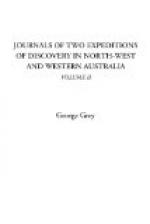INFLUENCE OF THEIR SONGS.
Is a native afraid, he sings himself full of courage; in fact under all circumstances he finds aid and comfort from a song. Their songs are therefore naturally varied in their form; but they are all concise and convey in the simplest manner the most moving ideas: by a song or wild chant composed under the excitement of the moment the women irritate the men to acts of vengeance; and four or five mischievously inclined old women can soon stir up forty or fifty men to any deed of blood by means of their chants, which are accompanied by tears and groans, until the men are worked into a perfect state of frenzy.
NATIVE POETS.
A true poet in Australia is highly appreciated. Simple as their songs appear, there are in them many niceties which a European cannot detect; it is probable that what is most highly estimated by this people is that the cadence of the song, and the wild air to which it is chanted, should express well to their ideas the feelings and passions intended to predominate in the mind at the moment in which it is sung: hence we find that the compositions of some of these poets pass from family to family, and from district to district, until they have very probably traversed the whole continent; the natives themselves having at last no idea of the point where they originated, or of the meaning of the words which they sing, successive changes of dialect having so altered the song that probably not one of the original words remains; but they sing sounds analogous to these, to the proper air. And this is not confined to Western Australia, for Mr. Threlkeld, in his Australian Grammar,* says:
There are poets among them who compose songs which are sung and danced to by their own tribe in the first place, after which other tribes learn the song and dance, which itinerates from tribe to tribe throughout the country, until, from change of dialect, the very words are not understood by the blacks.




